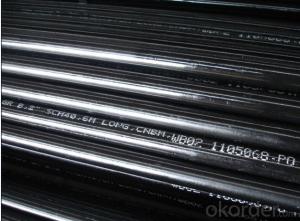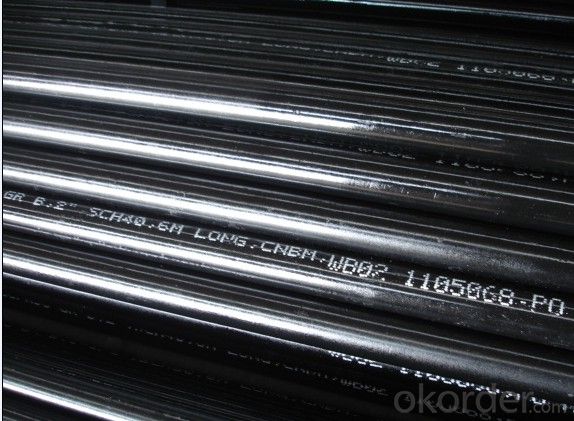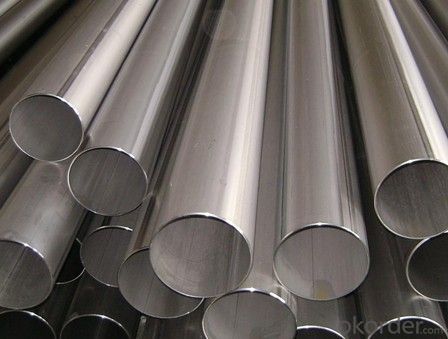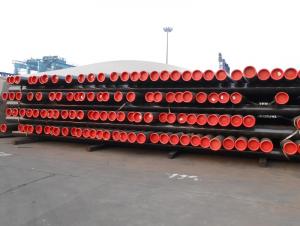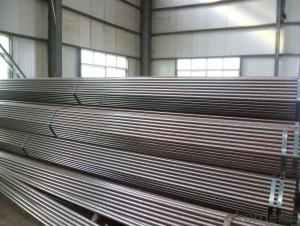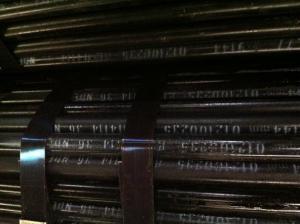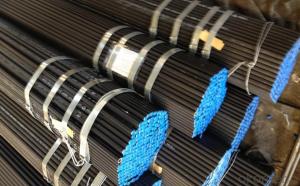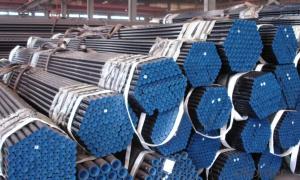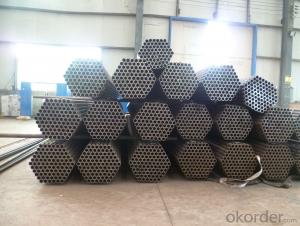Round Seamless Steel Pipe 1/2"
- Loading Port:
- China Main Port
- Payment Terms:
- TT or LC
- Min Order Qty:
- -
- Supply Capability:
- -
OKorder Service Pledge
OKorder Financial Service
You Might Also Like
1、Structure of Seamless Steel Pipe :
Seamless pipe is formed by drawing a solid billet over a piercing rod to create the hollow shell. Historically seamless pipe was regarded as withstanding pressure better than other types, and was often more easily available than welded pipe.
2、Main Features of the Seamless Steel Pipe:
• High manufacturing accuracy
• High strength
• Small inertia resistance
• Strong heat dissipation ability
• Good visual effect
• Reasonable price
3、Seamless Steel Pipe Specification:
Standard | GB, DIN, ASTM ASTM A106-2006, ASTM A53-2007 |
Grade | 10#-45#, 16Mn 10#, 20#, 45#, 16Mn |
Thickness | 8 - 33 mm |
Section Shape | Round |
Outer Diameter | 133 - 219 mm |
Place of Origin | Shandong, China (Mainland) |
Secondary Or Not | Non-secondary |
Application | Hydraulic Pipe |
Technique | Cold Drawn |
Certification | API |
Surface Treatment | factory state or painted black |
Special Pipe | API Pipe |
Alloy Or Not | Non-alloy |
Length | 5-12M |
Outer Diameter | 21.3-610mm |
Grade | 20#, 45#, Q345, API J55, API K55, API L80, API N80, API P110, A53B |
Standard | ASME, ASTM |
4、Packaging & Delivery
Packaging Details: | seaworthy package,bundles wrapped with strong steel strip |
Delivery Detail: | 15-30days after received 30%TT |
5、FAQ of Seamless Steel Pipe :
①How is the quality of your products?
Our products are manufactured strictly according to national and internaional standard, and we take a test
on every pipe before delivered out. If you want see our quality certifications and all kinds of testing report, please just ask us for it.
②How about price?
Yes, we are factory and be able to give you lowest price below market one, and we have a policy that “ for saving time and absolutely honest business attitude, we quote as lowest as possible for any customer, and discount can be given according to quantity”,if you like bargain and factory price is not low enough as you think, just don’t waste your time.Please trust the quotation we would give you, it is professional one.
③Why should you chose us?
Chose happens because of quality, then price, We can give you both.Additionally, we can also offer professional products inquiry, products knowledge train(for agents), smooth goods delivery, exellent customer solution proposals.Our service formula: good quality+good price+good service=customer’s trust
SGS test is available, customer inspection before shipping is welcome, third party inspection is no problem.
Any question, pls feel free to contact us !
6、Seamless Steel Pipe Images:
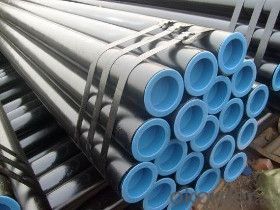
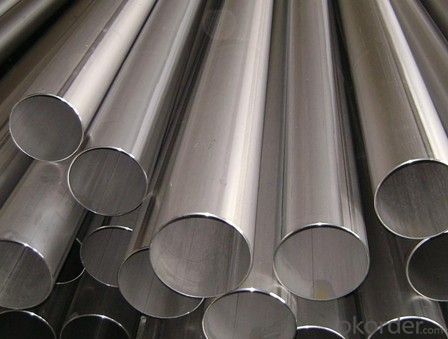
- Q: How do steel pipes handle extreme temperatures?
- Steel pipes are highly durable and can handle extreme temperatures due to their inherent strength and heat resistance. They have a high melting point, allowing them to withstand both very high and very low temperatures without compromising their structural integrity. Additionally, steel pipes have excellent thermal conductivity, which enables them to efficiently transfer heat and prevent damage caused by extreme temperature fluctuations.
- Q: Can steel pipes be used for natural gas distribution?
- Yes, steel pipes can be used for natural gas distribution. Steel pipes are commonly used in natural gas distribution systems due to their high strength, durability, and resistance to corrosion. They can safely transport natural gas over long distances and are widely accepted in the industry for this purpose.
- Q: How are steel pipes used in the construction of chemical plants?
- Steel pipes are widely used in the construction of chemical plants due to their durability, corrosion resistance, and ability to handle high pressure and temperature. These pipes are primarily utilized for transporting various chemicals, gases, and liquids within the plant, ensuring a safe and efficient flow of materials throughout the facility. They are commonly employed in the installation of process pipelines, utility systems, and structural supports, playing a crucial role in the overall functionality and reliability of chemical plants.
- Q: What are the different methods of joining steel pipes for high-pressure applications?
- There are several methods of joining steel pipes for high-pressure applications. These include butt welding, socket welding, threaded connections, and flanged connections. Butt welding involves joining the ends of two pipes by heating them and then pressing them together to create a strong and seamless connection. Socket welding involves inserting one pipe into the socket of another and then welding them together. Threaded connections involve screwing together two pipes using threaded fittings. Flanged connections involve using flanges to connect two pipes by bolting them together with gaskets to ensure a tight and leak-free joint. Each method has its own advantages and is chosen based on the specific requirements of the high-pressure application.
- Q: What is the average lifespan of steel pipes?
- The average lifespan of steel pipes varies depending on various factors such as their quality, usage, and maintenance. However, under normal conditions, well-maintained steel pipes can last for several decades or even longer.
- Q: What are the standard specifications for steel pipes?
- The standard specifications for steel pipes vary depending on the intended use and industry. However, some common standard specifications for steel pipes include dimensions (such as diameter, wall thickness, and length), material composition (such as chemical and mechanical properties), and specific requirements for different applications (such as pressure ratings or corrosion resistance). These specifications are established by industry organizations like ASTM International, American Society of Mechanical Engineers (ASME), and International Organization for Standardization (ISO) to ensure the quality, safety, and compatibility of steel pipes in various sectors such as construction, oil and gas, plumbing, and manufacturing.
- Q: Can steel pipes be used for sewage and wastewater systems?
- Yes, steel pipes can be used for sewage and wastewater systems. Steel pipes are highly durable, resistant to corrosion, and can withstand high pressure and temperature conditions, making them suitable for transporting sewage and wastewater efficiently and securely. Additionally, steel pipes have a long lifespan and can handle the abrasive nature of sewage and wastewater, making them a reliable choice for such systems.
- Q: What are the limitations of using steel pipes?
- There are several limitations to using steel pipes in various applications. Firstly, steel pipes can be quite expensive compared to other materials such as plastic or copper. This cost factor can be a significant limitation for projects with tight budgets. Secondly, steel pipes are susceptible to corrosion. Over time, exposure to moisture and certain chemicals can cause steel pipes to rust and deteriorate. This can lead to leaks, reduced structural integrity, and ultimately, the need for costly repairs or replacement. Another limitation of steel pipes is their weight and rigidity. Steel pipes are generally heavier and less flexible than other types of pipes, making them more challenging to install and maneuver in certain settings. Additionally, their rigid nature makes them less suitable for applications that require significant movement or flexibility. Furthermore, steel pipes can be prone to thermal expansion and contraction. When exposed to extreme temperatures, steel pipes can expand or contract, potentially causing stress on joints, fittings, or other components. This can lead to leaks or even pipe failure if not properly accounted for. Lastly, steel pipes are not as resistant to certain chemicals or substances as other materials. Some chemicals can corrode or erode the inner lining of steel pipes, compromising their integrity and potentially causing contamination or leakage. While steel pipes have many advantages, it is important to consider these limitations when deciding on the most suitable material for a specific application.
- Q: What are the different types of steel pipe supports?
- Some different types of steel pipe supports include pipe hangers, pipe clamps, pipe straps, and pipe saddles. These supports are used to secure and stabilize pipes in various applications, ensuring their proper alignment and preventing sagging or movement.
- Q: What is the difference between steel pipes and polyethylene pipes?
- Steel pipes are made of a strong and durable material, steel, which makes them suitable for high-pressure and high-temperature applications. They are also resistant to corrosion, making them ideal for transporting liquids and gases. On the other hand, polyethylene pipes are made of a flexible plastic material, which makes them easier to install and handle. They are lightweight, resistant to chemicals, and have a low risk of corrosion. However, they may not be suitable for very high-pressure or high-temperature applications.
Send your message to us
Round Seamless Steel Pipe 1/2"
- Loading Port:
- China Main Port
- Payment Terms:
- TT or LC
- Min Order Qty:
- -
- Supply Capability:
- -
OKorder Service Pledge
OKorder Financial Service
Similar products
Hot products
Hot Searches
Related keywords
